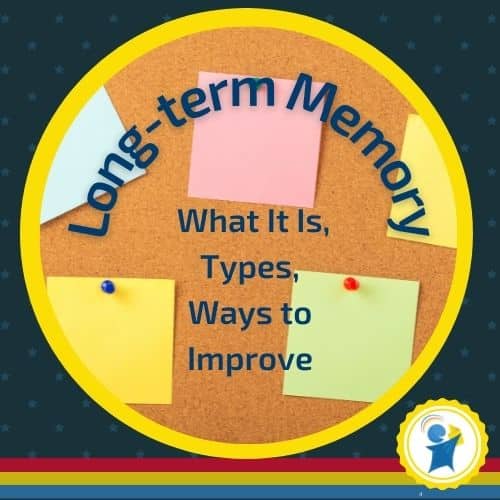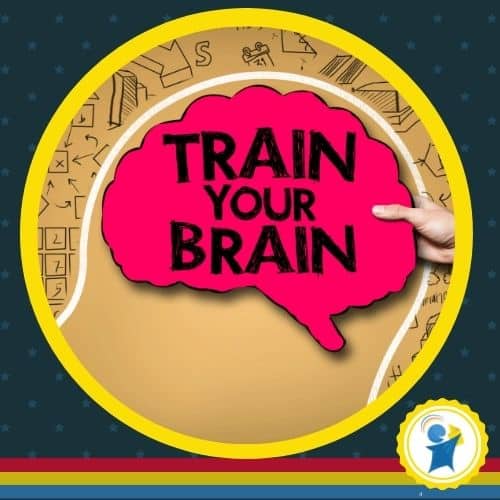
Long-term memory is the transfer of information from short-term memory into long-lasting memories. Long-term memory has an immense capacity, and memories can last a lifetime. We discuss types and stages of long-term memory, some facts about it, why it matters, and ways to improve it.
Table of contents:
- What is long-term memory?
- Types of long-term memory
- Stages of long-term memory
- Why long-term memory matters
- Facts about poor long-term memory
- How to improve long-term memory
- Key takeaways
What is long-term memory?
Long-term memory is the memory process that takes information from the short-term memory store and creates long-lasting memories. These memories can be from an hour ago or several decades ago. While short-term memory is limited in space and duration, long-term memory has an immense capacity, and memories can last for a lifetime.
Long-term memory plays a crucial role in forming and maintaining our identity. Recalling the name of our first-grade teacher or a second cousin, remembering where we went on vacation the past summer, or remembering our first kiss are all memories of past personal experiences. Memories provide us with a frame of reference based on experience and help shape our personalities.
Long-term memory also includes over-learned and automatic daily activities such as remembering how to brush your teeth or drive to work. And finally, long-term memory incorporates our encyclopedic knowledge of information such as who the first president was or how many days there are in a calendar year. We also appear to be storing information that we can’t consciously retrieve but still affects our behavior.
Long-term memory involves three stages, encoding, storage, and retrieval (getting information in, keeping it there, and then getting it back out), and appears to contain several different kinds.
Types of long-term memory
The various parts of long-term memory do not operate in isolation from one another. While it is not clear how they work together, it is clear that they are related and overlap.
Explicit (declarative) memory
Explicit — or declarative — memory is the kind of memory people usually refer to when they discuss memory. Explicit memory refers to experiences that we can recall intentionally and consciously.
Explicit memory can be divided into two categories: episodic and semantic.
- Episodic memories record life experiences. Your memory of your first day of school, the events at last week’s company meeting, or the birth of your first child are all examples of episodic memories. Retrieval of these memories usually involves associations with particular times or places.
- Semantic memories store information about the world independent of time, place, or other contexts. They store facts, rules, and concepts. Semantic memories include all organized knowledge you have about words, their meanings, and how you manipulate them. Factual knowledge, like the names of cities, the colors of flowers, and the characteristics of animals, are all stored in semantic memory.
Implicit (non-declarative) memory
Implicit — or non-declarative — memory is inaccessible to conscious awareness, the most common type being procedural memory.
- Procedural memories are memories for performing particular types of actions. While semantic memory is knowing “that,” procedural knowledge is knowing “how.” Here are some sentences that demonstrate procedural memory:
- I remember/know how to pick up a glass of water.
- I remember/know how to write my name.
- I remember/know how to tie my shoe.
When we retrieve information from procedural memory, we retrieve one step, which triggers the next, which triggers the next, and so forth.
Stages of long-term memory
Incoming information passes through sensory, short-term, and working memory before residing in long-term memory. Outgoing information is activated in long-term memory before passing through working memory and expressed behaviorally. Along its course, the information is encoded, stored, and retrieved.
- Encoding is the process by which information comes into our memory system (from sensory input) and is changed into a form that the system can cope with so that it can be stored. There are three main ways in which information can be encoded: visual (picture), acoustic (sound), and semantic (meaning). The information must be encoded to be remembered.
- Storage concerns the nature of memory stores, i.e., where the information is stored, how long the memory lasts (duration), how much can be stored at any time (capacity), and what kind of information is held. Scholars believe the capacity of long-term memory is unlimited, and its duration is a lifetime.
- Retrieval or remembering is getting information out of storage. There are two distinct forms of retrieval: recall, which refers to generating or reproducing stored information you have already acquired, and recognition, which refers to identifying familiar information.
Recognition is easier than recall. Multiple-choice tests are generally easier than fill-in-the-blanks tests or essays because it is less complicated to recognize the correct answer out of a group of possibilities than to dredge up the answer out of one’s head.
If you cannot remember something, it may be because you cannot retrieve it.
Why long-term memory matters

There is no learning without memory, and there is no memory without learning. In the school environment, the ability to rapidly and continuously process new information and store it for later recall is fundamental to success.
Every aspect of acquiring and applying academic skills and knowledge depends on adequately functioning long-term memory structures and processes, says Dehn in his book Long-Term Memory Problems in Children and Adolescents:
Reading decoding, reading comprehension, mathematics, spelling, basic writing skills, written expression, and academic subjects, such as science and social studies, all require effective encoding, storage, and retrieval of vast amounts of information. For example, progress in mathematics depends on the retention and efficient recall of basic math facts, and advances in written communication depend on remembering grammatical rules.
One of education’s goals is for students to retain knowledge and skills for a lifetime. When learning is effective, students with normal memory functioning can do just that.
Facts about poor long-term memory
Everyone knows that children and adolescents who have experienced a traumatic brain injury will likely have persistent memory problems, making learning challenging. But, what everyone doesn’t know, is that many other children fail to realize their academic potential because they have long-term memory deficits.
How many? Temple and Richardson screened more than 300 typical children aged 8 to 12 years for episodic and semantic memory problems in the United Kingdom. They discovered that 5.8 to 5.9% of the students with average IQ had specific memory difficulties. Given that this study excluded children with below-average IQ and identified learning disabilities, the number of students suffering from memory problems may be twice as high.
Students with learning disabilities frequently have one or more specific memory deficits within the short-term, working, and long-term memory systems. Although their memory deficits vary depending on the type of disability they experience, nearly every student with a learning disability has difficulty acquiring and retaining semantic information compared to ability-matched, non-disabled peers.
A considerable amount of empirical evidence supports the claim that students with dyslexia have deficits in the verbal aspects of short-term, working, and long-term memory.
A study published in Dyslexia documented a generalized impairment of episodic long-term memory capacities in dyslexic children. Specifically, they reported reduced verbal, visual-spatial, and visual-object long-term memory capacities in a group of 60 dyslexic children as compared to a group of 65 age-matched typical readers.
Another study, published in Frontiers in Psychology, provided evidence that poor visual long-term memory for details may play a causational role in dyslexia.
Because memory problems cover a continuum from mild to severe, they can be much more than minor inconveniences. In extreme cases, like global amnesia, the individual may have difficulty coping with daily routines. Even mild to moderate memory problems can impair many types of learning in children and adolescents, leading to lifelong limitations.
How to improve long-term memory
Since children who do not get enough sleep perform poorly on memory and attention tests, ensure they sleep enough.

Then remind yourself that memory is not a gift. Advertisers tout supplements and organic growers push blueberries. But, because memory is a skill, memory improvement requires training.
The belief that memory can be trained is not new. The Greeks, and later the Romans, developed some of the most prodigious memories the civilized world has ever seen. Memory was ranked as one of the most essential disciplines of oratory, a flourishing art at the time. They lived in an age without paper, so people couldn’t readily refer to notes. Speeches were committed to memory; lawyers depended on their memory in court; and poets, whose role in society was paramount, regularly drew on their enormous powers of recall to recite long passages of verse.
Today, external aids supplant memory. We rely on calculators, smartphones, computers, and the Internet to assist memory recall, with the result that people get very little training in developing and improving their memory skills.
How Edublox can help
Edublox offers cognitive training to develop and automatize the foundational skills of reading, spelling, writing, mathematics, and the skills required in academic subjects like social studies. The exercises target encoding, storage, retrieval, and various memory types: iconic, short-term, working, long-term, visual, auditory, sequential, and visuospatial.
In addition to cognitive training, Edublox offers live online tutoring targeting five academic areas: reading, spelling, writing, reading comprehension, and numeracy. These tailor-made sessions are offered in conjunction with cognitive training and are recommended for students with mild to severe learning disabilities.
Bonus exercise to train long-term memory
In addition to subscribing your child to Edublox’s cognitive training program, Development Tutor, select sequences below — or any other sequences — and teach your child to repeat these sequences by heart:
Days of the week (a must if your child doesn’t know the days of the week):
Monday, Tuesday, Wednesday, Thursday, Friday, Saturday, Sunday.
Months of the year (a must if your child doesn’t know the months of the year):
January, February, March, April, May, June, July, Augustus, September, October, November, December.
Eight planets that orbit the sun (in order from the sun):
Mercury, Venus, Earth, Mars, Jupiter, Saturn, Uranus, Neptune.
Jacob’s children, listed according to birth order:
Reuben, Simeon, Levi, Judah, Dan, Naphtali, Gad, Asher, Issachar, Zebulun, Dinah, Joseph, Benjamin.
Alphabet (a must if your child doesn’t know the alphabet):
A, B, C, D, E, F, G, H, I, J, K, L, M, N, O, P, Q, R, S, T, U, V, W, X, Y, Z.
NATO phonetic alphabet (International radiotelephony spelling alphabet):
Alpha, Bravo, Charlie, Delta, Echo, Foxtrot, Golf, Hotel, India, Juliet, Kilo, Lima, Mike, November, Oscar, Papa, Quebec, Romeo, Sierra, Tango, Uniform, Victor, Whiskey, X-ray, Yankee, Zulu.
Western Union phonetic alphabet:
Adams, Boston, Chicago, Denver, Easy, Frank, George, Henry, Ida, John, King, Lincoln, Mary, New York, Ocean, Peter, Queen, Roger, Sugar, Thomas, Union, Victor, William, X-ray, Young, Zero.
Old Testament books in order:
Genesis, Exodus, Leviticus, Numbers, Deuteronomy, Joshua, Judges, Ruth, 1 Samuel, 2 Samuel, 1 Kings, 2 Kings, 1 Chronicles, 2 Chronicles, Ezra, Nehemiah, Esther, Job, Psalms, Proverbs, Ecclesiastes, Song of Songs, Isaiah, Jeremiah, Lamentations, Ezekiel, Daniel, Hosea, Joel, Amos, Obadiah, Jonah, Micah, Nahum, Habakkuk, Zephaniah, Haggai, Zechariah, Malachi.
U.S. states in alphabetical order:
Alabama, Alaska, Arizona, Arkansas, California, Colorado, Connecticut, Delaware, Florida, Georgia, Hawaii, Idaho, Illinois, Indiana, Iowa, Kansas, Kentucky, Louisiana, Maine, Maryland, Massachusetts, Michigan, Minnesota, Mississippi, Missouri, Montana, Nebraska, Nevada, New Hampshire, New Jersey, New Mexico, New York, North Carolina, North Dakota, Ohio, Oklahoma, Oregon, Pennsylvania, Rhode Island, South Carolina, South Dakota, Tennessee, Texas, Utah, Vermont, Virginia, Washington, West Virginia, Wisconsin, Wyoming.
Kings and Queens of England since 1066:
William I, William II, Henry I, Stephen, Henry II, Richard I, John, Henry III, Edward I, Edward II, Edward III, Richard II, Henry IV, Henry V, Henry VI, Edward IV, Edward V, Richard III, Henry VII, Henry VIII, Edward VI, Mary I, Elizabeth I, James I, Charles I, Charles II, James II, William III & Mary II, Anne, George I, George II, George III, George IV, William IV, Victoria, Edward VII, George V, Edward VIII, George VI, Elizabeth II.
Edublox offers cognitive training and live online tutoring to students with dyslexia, dysgraphia, dyscalculia, and other learning disabilities. Our students are in the United States, Canada, Australia, and elsewhere. Book a free consultation to discuss your child’s learning needs.
Key takeaways
References:
Dehn, M. J. (2010). Long-term memory problems in children and adolescents: Assessment, intervention, and effective instruction. Hoboken, NJ: Wiley.
Huestegge, L., Rohrßen, J., van Ermingen-Marbach, M., Pape-Neumann, J., & Heim, S. (2014). Devil in the details? Developmental dyslexia and visual long-term memory for details. Frontiers in Psychology.
Menghini, D., Carlesimo, G. A., Marotta, L., Finzi, A., & Vicari, S. (2010). Developmental dyslexia and explicit long-term memory. Dyslexia, 16(3): 213–25.
Temple, C. M., & Richardson, P. (2006). Developmental amnesia: Fractionation of developing memory systems. Cognitive Neuropsychology, 23(5): 762–88.


